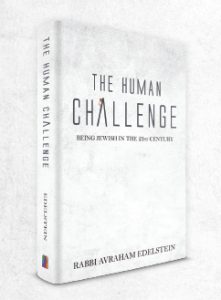
Olami Resources is happy to present a series of free installments featuring Rabbi Avraham Edelstein’s important new book, The Human Challenge. This week we are sharing the second essay from Section One – A Purposeful Life – entitled, Freedom.
___________________
When we know our purpose,
commitment is an engagement, not a constraint.
PROGRESS AS A MEANS AND AS AN ENDS
“Death,” said the American political activist Norman Cousins, “is not the greatest loss in life. The greatest loss is what dies inside us while we live.”
We see our world progressing — more modern this, more cutting-edge that. Looking back in time, it is clear that humanity has come a long, long way. But where is this all going? What is it exactly that progress is bringing to the quality of mankind? Is it to live longer and healthier,
with more heating and air-conditioning and connectivity?
Those cannot be the answers to this question, because they are simply means, and when we confuse means with ends, we start dying on the inside. We want to live longer and more comfortably — to do what? We want to have more air-conditioning — to achieve what? What legacy do we want to leave? What is worthy of our attention, time, and effort? Presumably, if we are serious about life, we are not simply looking to be more comfortable. Yet that is exactly what most of the things we buy are claiming to do.
THE JEWISH IDEA OF FREEDOM
The contemporary concept of freedom is based on the possibility for each to express his or her desires, creativity, and productivity. It stresses the maximum removal of external restraints. It is a combination of autonomy and means. In essence, it is a freedom from constraints — do what you want — as opposed to freedom to become something. [1] Yet, this contemporary framework of freedom is half-baked. It ignores the question of where this all takes us. It is “freedom from” without the idea of “freedom to.”
The Jewish concept of freedom proposes a radical theology. It begins with the understanding that the freest being in existence is G-d. Therefore, the metric for freedom is likeness to G-d. It is not a freedom from, but rather a freedom to — to become as G-d-like as we possibly can. It is not an emphasis on what constrains me, but rather what commitments and obligations I can make in the process of transcending myself. There is a common misconception that aligns freedom with the maximization of choices — that the more one has from which to choose, the greater his freedom. Yet, we are not free when we keep our choices open. Having an abundance of choice and failing to use that choice to commit to something produces paralysis, not freedom.
For sure, we need freedom from — freedom from hunger and illness, oppression, and war. But this is not the end goal. If everyone is truly free, why are we here? What do we do with our lives? Freedom makes the journey possible; it is to allow us to choose the path that will be most meaningful to our lives. [2] Perforce, that path will require commitment, limitations of options, and the undertaking of responsibilities. But this is the only way we can release the opportunities to fulfill our potential, and that, after all, is what everyone wants from freedom.
[1] The Jewish-English philosopher, Isaiah Berlin, made this distinction in his book, Two Concepts of Liberty.
[2] Freedoms from include from being censored, from unjust incrimination, from forced religion,
respectively. It is arguable that some of the higher freedoms, like freedom of speech, the right to remain silent, and religious freedom are also essentially freedom froms. They are there to allow us to actualize ourselves as we see fit.
Read the previous essay, Belief as a Relationship.
Purchase a copy of The Human Challenge.
Rabbi Avraham Edelstein serves as the Education Director of Neve Yerushalayim College for Women and a senior advisor to Olami. Many of Rabbi Edelstein’s foundational publications addressing the world of Kiruv appear on OlamiResources.com.



















